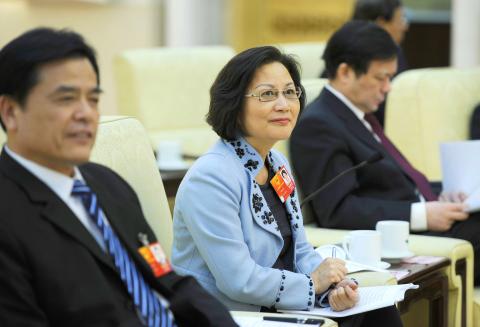Justin Lin (林毅夫), who defected to China in 1979 and currently works as a vice president at the World Bank, would be arrested and face charges of treason if he came back to Taiwan, the Ministry of National Defense (MND) said yesterday.
At a legislative meeting on March 7, Chinese Nationalist Party (KMT) Legislator Chang Ching-chung (張慶忠) urged the government to allow Lin to return to Taiwan on humanitarian grounds. Mainland Affairs Council Minister Lai Shin-yuan (賴幸媛) said at the time that while the council did not oppose Taiwanese who have lived in China for a long period of time returning to the country to visit family, Lin’s case was a military matter and the council respected the ministry’s position.
Lin’s wife, Chen Yun-ying (陳雲英), said in Beijing on Saturday that Lin was scheduled to leave his post at the World Bank in June and his greatest wish after retirement was to come back to Taiwan.

Photo: Liu Jin, AFP
Chen, who serves as a member of China’s National People’s Congress, said she and her husband had long dreamed of returning to Taiwan.
Minister of National Defense Kao Hua-chu (高華柱) told the legislature’s Foreign Affairs and National Defense Committee meeting yesterday that Lin had committed treason under military law and was “still committing the crime.”
Lin would be arrested immediately and face military prosecution upon entering Taiwan, Kao added.
Lin defected to China in 1979 when he was serving as an army captain on the outlying island of Kinmen. After serving as an economist in Beijing, he became a vice president and chief economist at the World Bank.
In May 2002, Lin filed an application from Beijing to return to Taiwan to attend his father’s funeral. Taiwanese authorities approved his application, but warned that he could face legal consequences if he returned. Lin decided not to risk detention and did not attend his father’s funeral.
Lin’s defection would be subject to a death sentence, life sentence or imprisonment for more than 10 years according to the Criminal Code of the Armed Forces, Taiwan Solidarity Union (TSU) caucus whip Hsu Chung-hsin (許忠信) said.
Hsu said the ministry listed the former company commander as “missing” in 1979 when he defected and paid his family compensation of NT$470,000.
Lin’s family never returned the compensation and his case was not classified as a defection until Nov. 8, 2002, by the Military High Court, Hsu said. That means the 30-year statute of limitation on his case has not expired.
Allowing the Lin family to return would be seen as support for China’s “united front” strategy and caving in to pressure from Beijing in the guise of a “humanitarian” cause, TSU Legislator Huang Wen-ling (黃文玲) said.
The ministry tried to have Lin extradited after Taiwan and China signed an agreement on judicial assistance, but the request was rejected by Beijing, Democratic Progressive Party Legislator Hsueh Ling (薛凌) said.
China blatantly rejected Taiwan’s request to extradite four defectors: Lin, former army Lieutenant Wang Yi-hung (王宜宏) and two fighter pilots, Huang Chih-cheng (黃植誠) and Lin Hsien-shun (林賢順), Hsueh said.
Hsueh added that the ministry was suspected of a cover-up in Lin’s case, as it had initially assessed that the case was a defection.

A preclearance service to facilitate entry for people traveling to select airports in Japan would be available from Thursday next week to Feb. 25 at Taiwan Taoyuan International Airport, Taoyuan International Airport Corp (TIAC) said on Tuesday. The service was first made available to Taiwanese travelers throughout the winter vacation of 2024 and during the Lunar New Year holiday. In addition to flights to the Japanese cities of Hakodate, Asahikawa, Akita, Sendai, Niigata, Okayama, Takamatsu, Kumamoto and Kagoshima, the service would be available to travelers to Kobe and Oita. The service can be accessed by passengers of 15 flight routes operated by

Alain Robert, known as the "French Spider-Man," praised Alex Honnold as exceptionally well-prepared after the US climber completed a free solo ascent of Taipei 101 yesterday. Robert said Honnold's ascent of the 508m-tall skyscraper in just more than one-and-a-half hours without using safety ropes or equipment was a remarkable achievement. "This is my life," he said in an interview conducted in French, adding that he liked the feeling of being "on the edge of danger." The 63-year-old Frenchman climbed Taipei 101 using ropes in December 2004, taking about four hours to reach the top. On a one-to-10 scale of difficulty, Robert said Taipei 101

Taiwanese and US defense groups are collaborating to introduce deployable, semi-autonomous manufacturing systems for drones and components in a boost to the nation’s supply chain resilience. Taiwan’s G-Tech Optroelectronics Corp subsidiary GTOC and the US’ Aerkomm Inc on Friday announced an agreement with fellow US-based Firestorm Lab to adopt the latter’s xCell, a technology featuring 3D printers fitted in 6.1m container units. The systems enable aerial platforms and parts to be produced in high volumes from dispersed nodes capable of rapid redeployment, to minimize the risk of enemy strikes and to meet field requirements, they said. Firestorm chief technology officer Ian Muceus said

MORE FALL: An investigation into one of Xi’s key cronies, part of a broader ‘anti-corruption’ drive, indicates that he might have a deep distrust in the military, an expert said China’s latest military purge underscores systemic risks in its shift from collective leadership to sole rule under Chinese President Xi Jinping (習近平), and could disrupt its chain of command and military capabilities, a national security official said yesterday. If decisionmaking within the Chinese Communist Party has become “irrational” under one-man rule, the Taiwan Strait and the regional situation must be approached with extreme caution, given unforeseen risks, they added. The anonymous official made the remarks as China’s Central Military Commission Vice Chairman Zhang Youxia (張又俠) and Joint Staff Department Chief of Staff Liu Zhenli (劉振立) were reportedly being investigated for suspected “serious